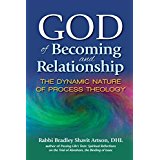In Process theology God is dynamic, creation is continuing, reality is relational.
Although the world may seem to be filled with independent substances, the whole cosmos is actually interacting, always dynamic, constantly in process. In Process theology God is not distant from this process, watching from afar, but intimately involved, connected, and relating.
The Hebrew word for that dynamic relating is brit, “covenant” – always interactive, always connective, always relational. (God of Becoming, p. 9)
Then God said to Noah…”As for me, I am establishing my covenant with you and your descendants after you, and with every living creature that is with you, the birds, the domestic animals, and every animal of the earth with you….” (see Genesis 9:8-17f)
Text study: What has “covenant” always meant to you? Has your understanding expanded through this discussion?
Through our choices, we are always becoming.
In every moment, we are coming into being again and again; we’re always facing possibilities, from which we have to choose. We make our choices from our particular context (which is the sum total of our previous choices, and the sum total of the world’s previous choices). Yet the future remains open to decisions we have yet to make – which means that freedom is an inherent quality of the world.
The cosmos is a partner with God in its own becoming. In every moment, God is offering us choices; after we make a choice, our decision not only affects us, but affects God and God’s consequent nature. Then God holds out another choice to us, which we are free to take or free to reject – and then God meets us in the next choice with the next possibility. Because the future is still open, God doesn’t and can’t know the future.
The dipolarity of God
Monopolarity: Nevertheless, dominant Western theology has taught that God is monopolar (if God is simple, then God cannot be complex; if God is eternal, then God cannot be dynamic; if God is perfect, then God cannot be changed by relationships with creation).
Dipolarity: In order to understand reality – to comprehend the fullness of what is in front of us – we need to grasp all polarities. Both A and B can be true if they refer to distinct facets of a phenomenon; for instance, a man can be both father and son at the same time. (p. 12)
In chapter 2 Artson writes, “God is the source of the creative, responsive love that pervades the world….Process thinkers apply the notion of dipolarity to God and to God’s creation…” (p. 12-13)
Jeremiah 23:23: Am I only a God near at hand – says the Holy One – and not a God far away? If a person enters a hiding place, do I not see him? – says the Holy One. For I fill both heaven and earth – declares the Holy One.
Isaiah 57:15: For thus says the high and lofty one, who inhabits eternity, whose name is Holy: I dwell in the high and holy place, and also with those who are contrite and humble in spirit; to revive the spirit of the humble, and to revive the heart of the contrite.
What kind of God do you find here?
Reflecting with the Rabbis:
What do you think? Artson writes, “Torah offers examples of God’s dipolarity through different titles for God: Elohim and Adonai – Elohim for God’s absolute eternity and limitlessness, Adonai for the God who enters into time and relationship with all creation. Thus God is eternal in some respects, and yet dynamic in other respects.” (p. 13) And …. “Process theology sees God’s dipolarity in a cosmos established through fixed, changeless propensities – yet still evolving, still generating novelty all the time.” (p. 15)
What do you think? Scripture portrays a God who dwells within the world, who meets people in relationship, and who expresses emotion. (The rabbis write, “From the first day of creation, the blessed Holy One longed to enter into partnership with the terrestrial world, to dwell with God’s creatures within the terrestrial world. (p. 15)



God not only enters time and space;God may have created time and space. If God is omnipresent and ubiquitous, then by definition, God enters our live. It is very possible that God may be the determinant of our lives.